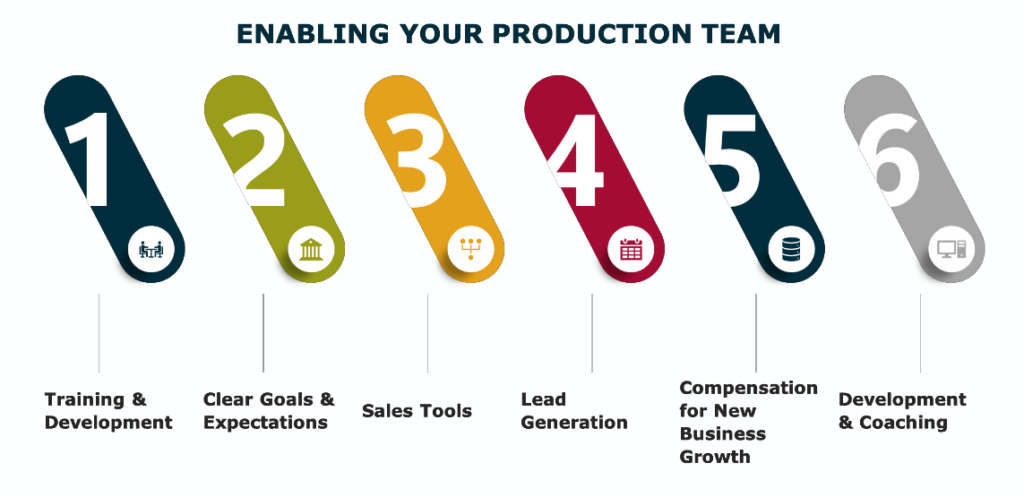What’s the one thing your clients and prospects don’t want your producers to talk about? Believe it or not, the answer is insurance. Your clients want solutions to their specific business problems, not a laundry list of products. This best practice is just one way to differentiate your business, but there are many other strategies that can elevate the performance of your producers and drive success in the insurance industry. Here are six steps to developing a top sales team:

1. Prioritize training and development. If your firm conducts an annual sales kickoff, how much do you focus on training? Training and developing producers should be a core part of your culture. Start by looking at the team’s weak spots. How are their sales conversion rates or relationship-building abilities? Can they handle and overcome objections? Create training and onboarding programs specific to these core skills or any areas you identify as needing improvement. Remember that it’s not just about learning insurance products and markets. Producers should be focused on how to articulate your offer in a way that’s specific to the client’s needs.
2. Set clear goals and expectations. Ensure producers have a new business revenue goal, one that is challenging, yet realistic. If they brought in $80,000 last year maybe aim for $100,000 this year. Besides a lag indicator, (like new annual commissions), what lead expectations do they have for number of calls, appointments, quotes and binds by market segments? Use outside resources that can provide benchmarking for your producers’ performance, like a Producer Stack Ranking.
3. Provide effective sales tools. When selecting sales technology and platforms, test the tool’s ability to decrease the time your salespeople spend on administrative tasks while increasing the time spent on closing deals. Effective CRMs and other automation tools should help your producers organize their book of business, assist with operations, and manage sales. Tools that provide a customizable, user-friendly interface for client management will enable your producers to sell more and spend more time with clients.
4. Drive better lead generation. One of the most important parts of advising your production team is supporting them in uncovering prospects and targeting the right potential buyers. The best producers tend to be industry experts; they focus on a certain industry-niche (or two) and become actively involved in that community. This may start with activities such as attending happy hours at chamber events but should eventually lead to higher-profile positions in industry-specific associations or networking groups. Your firm can support lead gen efforts by ensuring consistency in brand messaging, providing insights on the target audience and demographics, or recommending strategies for marketing/advertising campaigns. This enables producers to be more intentional in hunting for business and helps them proactively prospect larger accounts.
5. Offer compensation for new business growth. When you look at your current compensation model, is it driving the desired results? One of the key objectives of compensation plans should be to drive new business. For example, MarshBerry typically recommends a 15% to 20% difference between new and renewal commission rates, which motivates producers to focus on new business production over renewal compensation. A carrot and stick model, which offers a “carrot” (such as commission) for strong performance and a “stick” (such as renewal rate reduction) for underperformance can help create accountability in the sales process and encourage producers to meet goals.
6. Incorporate continuous coaching. You can support your team’s ongoing, long-term success with specialized mentoring and coaching programs. Role playing exercises, one-on-one coaching, sales playbooks and best practices, peer learning and collaboration (sales meetings) can take the training from step one to the next level and build deeper skills. Remember that new business revenue goal from above? Make a coaching plan to get them there.
Talent development benefits your business for the long term. Today, meeting client expectations is more complicated than ever with expectations for personalization, quick turnaround, and digital solutions constantly increasing. These trends are making the insurance industry more complex and competitive, so it’s imperative that you have a good sales strategy. In turn, those top performers will mentor and train the next generation of producers and reinforce a world-class production team.
MarshBerry’s 2025 Agency & Brokerage Compensation Report: Available for Purchase
MarshBerry’s 2025 Insurance Agency & Brokerage Compensation Report explores the prevalent compensation trends concerning insurance agents and brokers. This one-of-a-kind report comprehensively examines current compensation data for 38 roles commonly found across insurance agents and brokers. The report offers insight into Executive & Management Compensation, Production, Service Staff, and Support Staff.
